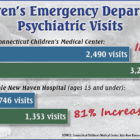A pilot project to provide coordinated care to children insured by Medicaid resulted in more Connecticut children receiving preventive dental services, mental health care and well-child visits, according to a new report by the Child Health and Development Institute of Connecticut, Inc.
“Care coordination is especially important for children, as they benefit most when their needs are detected early and they receive intervention services,” the report says. “The primary care medical home is an ideal venue for detecting children’s problems at the earliest possible age and connecting families to helpful interventions and supports outside of the primary care site.”
The evaluation of the “Health Outreach for Medical Equality” project, dubbed “H.O.M.E.,” found that adding care coordinators to work with low-income children in the HUSKY insurance program boosted the percentage of Hartford children ages 2 and younger using dental services – 34 percent for those who received care coordination, vs. 25 percent of Hartford children overall. In addition, children who received H.O.M.E. services accessed behavioral and mental health services at a significantly higher rate than the overall Hartford HUSKY population. The increased access to dental and mental health care “pays off tremendously in the long run,” in terms of both health outcomes and cost savings, as problems are addressed earlier, said Lisa Honigfeld, vice president for health initiatives at the Child Health and Development Institute.


